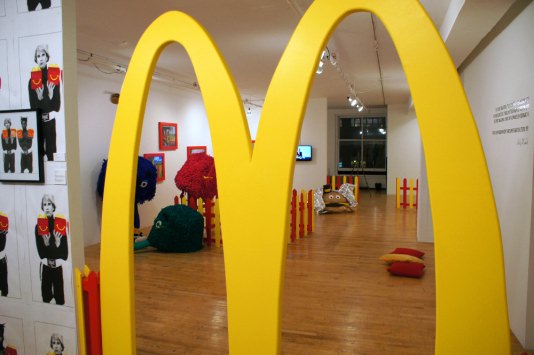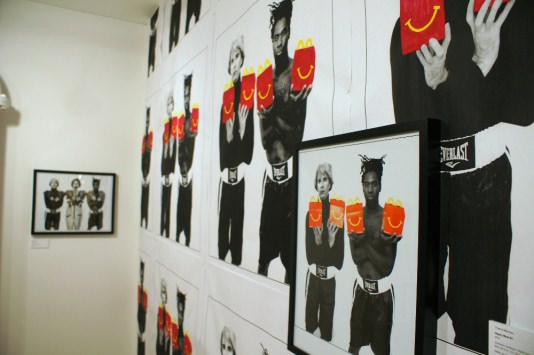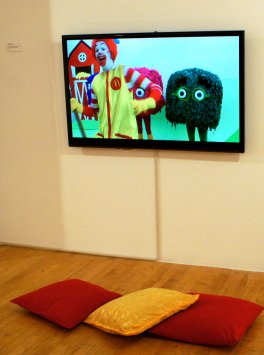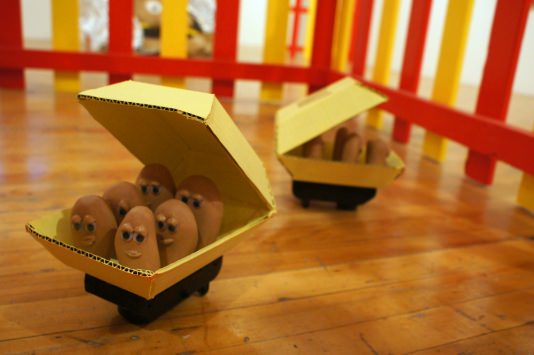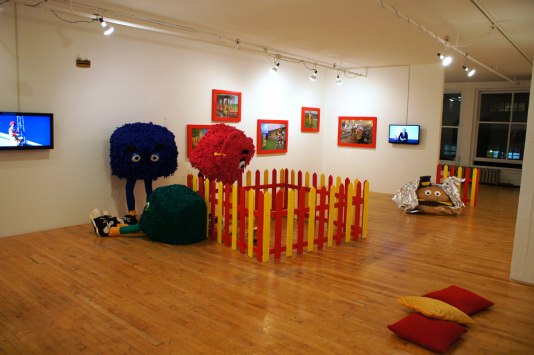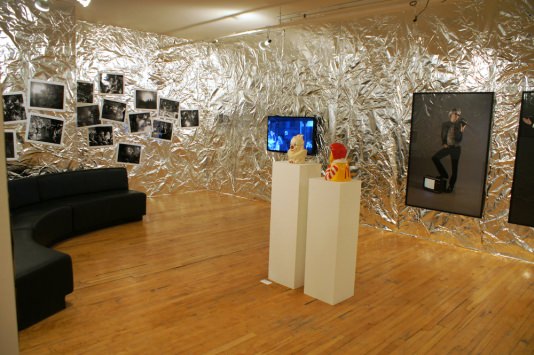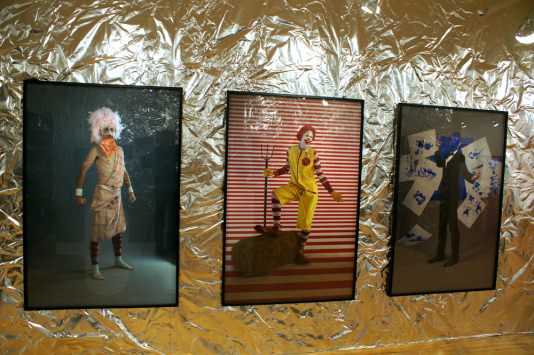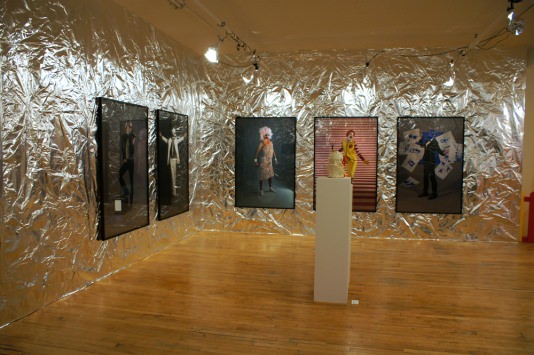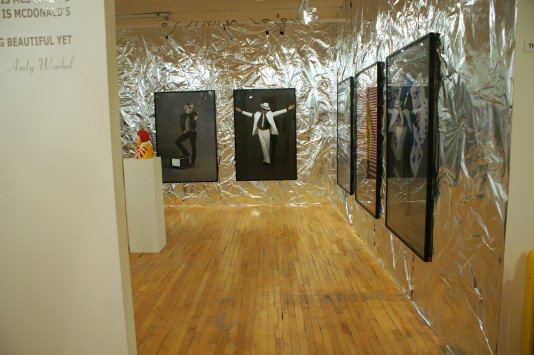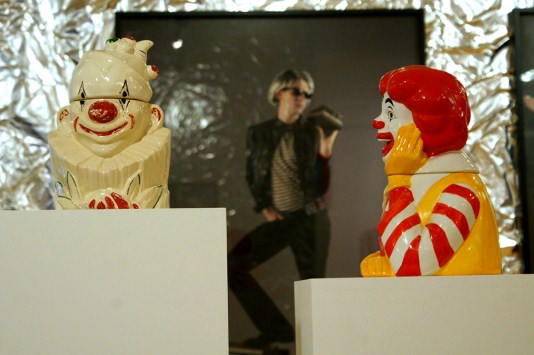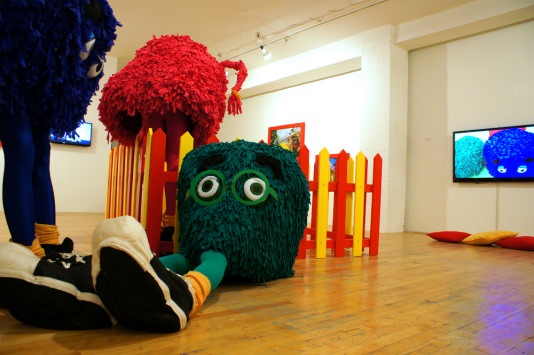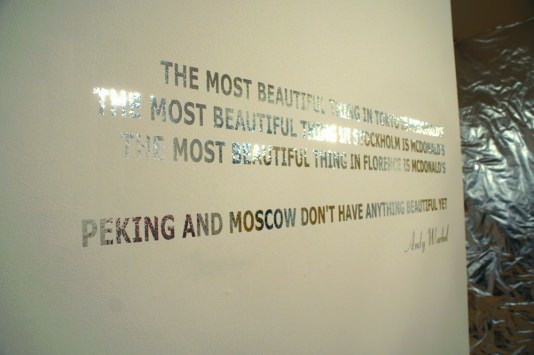Thierry Marceau
Happy Meal
Opening-event : Saturday, November 30, 4 pm - 6 pm
I believe in magic
(Portrait of the artist as an idiot)
by Nicolas Mavrikakis, curator of the exhibition
“It’s great”
Andy Warhol (Mascot of Pop Art, 1928-1987)
“I’m loving it”
Ronald McDonald (Pop artist born in 1963)
I did not write the following texts. I did not translate them (Google Translate did). I did not pay the person who printed that patchwork of texts or sent it to you. But I find it great to quote each of them.
One
The most beautiful thing in Tokyo is McDonald's.
The most beautiful thing in Stockholm is McDonald's.
The most beautiful thing in Florence is McDonald's.
Peking and Moscow don't have anything beautiful yet.
Andy Warhol, The Philosophy of Andy Warhol (1975) - Chapter 4 : Beauty
Book written by Pat Hackett with the collaboration of Bob Colacello and Brigid Berlin.
Two
When you believe in magic
- And I hope you do -
You’ll always have a friend
Wearing a big nice wig.
Anything can happen
Right before your eyes.
Whatever you’re expecting,
Expect a surprise.
I believe in magic.
I believe in you.
Three
It’s a good time for the great taste.
Four
Conversation between the dealer and collector Alberto Mugrabi and the art critic Robert Hughes.
Robert Hughes: Somebody told me that your father had something like 800 Warhol’s. Is that true?
Alberto Mugrabi: Yeah, it is true.
[Silence et wary look]
RH: What's your opinion of Warhol?
AM: I think Warhol is… probably one of the most… visionary artist of our time. He’s an artist that has opened every door for every artist today.
RH: Did you know him?
AM: No, I never met Andy Warhol.
RH: I used to. I thought he was one of the stupidest people I'd ever met in my life.
Five
What’s great about this country is that America started the tradition where the richest consumers love and want to buy essentially the same things as the poorest. You can be watching TV and see Coca-Cola, and you know that the President drinks Coke, Liz Taylor drinks Coke, and just think, you can drink Coke, too. A Coke is a Coke and no amount of money can get you a better Coke than the one the bum on the corner is drinking. All the Cokes are the same and all the Cokes are good. Liz Taylor knows it, the President knows it, the bum knows it, and you know it.
Andy Warhol, The Philosophy of Andy Warhol (1975) - Chapter 6 : Work
Book written by Pat Hackett with the collaboration of Bob Colacello and Brigid Berlin.
Six
Andy Chance is a middle-aged man who lives in the townhouse of an old, wealthy man in Pittsburgh. He is simple-minded, has lived there his whole life, tending his garden and the gardens of his neighbors, eating Campbell’s Soups. Other than gardening, his knowledge is derived entirely from what he sees on television, especially TV ads. When his benefactor dies, Chance is forced to leave and discovers the outside world for the first time.
Chance wanders aimlessly, wearing his former employer's expensive clothes. Chance passes by a TV shop and sees himself captured by a camera in the shop window. Entranced, he steps backward off the sidewalk and is struck by a chauffeured car owned by Ronald Wand-Advertising, a business mogul. In the back seat of the car sits Wand-Advertising's wife Eve.
Eve brings Chance to their home to recover. Drinking alcohol for the first time in the car ride home, Chance coughs as he tells Eve his name. Eve mishears "Chance the Gardener" as "Chauncey Gardiner". Judging from Chance's appearance and manners, Ronald Wand-Advertising assumes that Chance is an upper class, highly-educated businessman. Chance's style (especially his wigs) and seemingly-insightful ways embody the qualities Wand-Advertising admires. Chance's very simplistic utterances about gardens or from TV ads are interpreted as allegorical and profound statements about business, the state of the economy and society.
Wand-Advertising is also a confidant and adviser of the U.S. President, whom he introduces to "Chauncey". The president interprets Chance's remarks about how the garden changes with the seasons as economic and political advice. Chance, as Chauncey Gardiner, quickly rises to national public prominence. He becomes a media celebrity with an appearance on a television talk show and soon rises to the top of U.S. society. He remains very mysterious, as the Secret Service men are able to learn almost nothing about his background. Public opinion polls start to reflect just how much his "simple brand of wisdom" resonates with the jaded American public.
The President dies of aplastic anemia. At his funeral, members of the board of Wand-Advertising’s companies hold a whispered discussion over the replacement for the President. As the President’s coffin is about to be interred in his mausoleum, they unanimously agree on "Chauncey Gardiner".
Source: Wikipedia
About the movie Being There (1979) by Hal Ashby
Seven
What do you think of Jasper Johns ?
Warhol: I think he’s great.
Why ?
Warhol: Well… Well… He makes such great lunches.
Eight
I’m loving it
It’s a good time for the great taste
Feed your inner child
Bacon bacon bacon
What you want is what you get, every day in every way
The celebrities eat it
Enjoy more
Nine
Andy Warhol: I think everybody should like everybody.
Gene Swenson: Is that what Pop Art is all about?
Andy Warhol: Yes, it's liking things.
"What Is Pop Art?", Art News, November 1963
Ten
Irony is ordering a liqueur sur glace on the Titanic while it is sinking.
News
No news at the moment.

